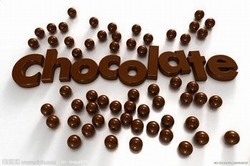 The Swiss company, which makes chocolate and chocolate products for big food companies such as Nestle, spent $950 million in December on the cocoa liquor, butter and powder business of Singapore group Petra to step up expansion into high-growth emerging markets.
The Swiss company, which makes chocolate and chocolate products for big food companies such as Nestle, spent $950 million in December on the cocoa liquor, butter and powder business of Singapore group Petra to step up expansion into high-growth emerging markets.The acquisition will be financed by a $300 million capital increase and $600 million bond, which already cost Barry Callebaut its investment grade credit rating.
Chief Executive Juergen Steinemann said initial expenses related to the acquisition had weighed on profits. He said completion of the deal and integration were well on track.
Steinemann said half-year results were also hit by an unfavourable combined cocoa ratio, which meant prices for the group's cocoa ingredients like cocoa butter and powder fell more than prices for cocoa beans.
But this trend should reverse in the second half.
Chief Financial Officer Victor Balli said the combined cocoa ratio had gone up a lot due to higher prices for cocoa butter. "Chocolate demand went up and prices followed, that will help us in the second half."
Balli also said the cocoa bean crop outlook was relatively good. "We expect prices to stay stable or to fall slightly."
The prospect of a large West African April-September cocoa crop plus a lag in forward sales from Ivory Coast and Ghana pushed cocoa prices to an 11-month low in March.
Barry Callebaut, the world's biggest maker of finished chocolate products, has been benefiting from a trend towards outsourcing chocolate production. This helped the group to outgrow the market in its first half, with sales volumes rising 7.8 percent in a chocolate market that grew only 1.5 percent.
The company is working on new outsourcing deals.
"Asia is definitely the market with the biggest potential for us: we want to be in India and also grow our business in China, Turkey and Russia," Balli told Reuters. He said emerging markets consumed a lot of cocoa powder so that this market was actually growing faster than the chocolate market, at about 2-5 percent.
Balli said the group, which is controlled by the Jacobs family, hoped to regain its investment grade credit rating in about three years.
Net profit in the half-year to February fell to 116.4 million Swiss francs ($124.7 million), below a forecast of 129 million francs in a Reuters poll.
But sales volumes grew 5.8 percent in Europe, the group's largest market, despite the "challenging" market environment in southern Europe. Chocolate sales have been holding up because people are reluctant to give up their favourite chocolate treats even if money is tight.
Hershey, also one of Barry Callebaut's customers, last month forecast sales to grow 5-7 percent this year, while Swiss peer Lindt aims to increase underlying sales by 6-8 percent.
"BC (Barry Callebaut) convinces once more with high volume growth," Sarasin analyst Patrick Hasenboehler said in a note. "However, BC was not able to transfer this top-line growth into the bottom-line results." He also said the planned capital increase was also likely to be a drag on the shares.
Barry Callebaut shares were down 1.9 percent at 895.5 francs by 0705 GMT, compared to a 0.4 percent firmer European food and beverage index. ($1 = 0.9332 Swiss francs)





